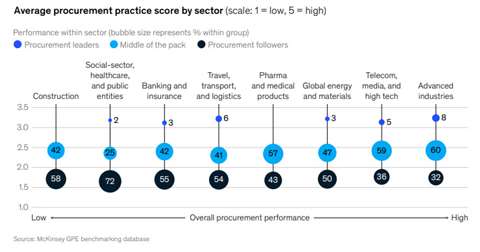Why are construction’s procurement practices less effective than other sectors?
27 April 2023
 (Image: Halfpoint via AdobeStock - stock.adobe.com)
(Image: Halfpoint via AdobeStock - stock.adobe.com)
Construction scores low on its procurement practices compared to other industries.
And its lack of sophistication in this area is costing businesses money.
Procurement typically accounts for 40-70% of a company’s total spending, according to a new report about procurement in construction by management consultant McKinsey. And recently, amid rising inflation triggered by the Ukraine war, construction firms have doubled down on their procurement strategy to navigate uncertainty,
A recent survey, revealed in McKinsey’s report, reveals that many chief procurement officers in construction believe that applying best-in-class procurement practices can generate savings of as much as 12%.
So why isn’t construction doing better, given the obvious financial benefits to more effective procurement?
The report’s authors offer two principal factors: First of all there are external challenges such as limited control over project specifications and complex, fragmented supply chains.
And then there are the internal obstacles, including decentralised, project-by-project mindsets.
 Source: McKinsey
Source: McKinsey
McKinsey recommended optimising procurement across three layers, supported by improvement in two areas.
The three areas it recommended construction companies improved their procurement efforts were:
1) Commercial optimisation (30%): Using purchasing power to buy cheaper and align contracting strategy with the supplier landscape and the company’s own capabilities.
2) Demand optimisation (50%): Buying the right amount by optimising purchase quantities through demand planning and forecast, stock reduction and surplus optimisation.
3) Technical optimisation (20%): Buying well by influencing designs or specifications to reduce total cost of ownership.
It suggested supporting those three levels by reorganising construction businesses to see procurement as a value-creating function, and having a suite of digital tools that harness supplier knowledge and market data to improve the company’s competitive position.
Decarbonising through better procurement
McKinsey’s report also highlighted how optimising procurement could drive decarbonisation at the same time as improving profitability.
It identified three near-term levers and three long-term levels that could help procurement play a key role in decarbonisation.
The near-term levers are:
1) Creating transparency for the CO2 footprint by developing views of the full life cycle and providing estimates of emissions in material sourcing – for example, assessing the impact of sustainable versus non-sustainable materials.
2) Gaining a granular on how materials and suppliers differ on cost and CO2 emissions.
3) Procurement teams working hand-in-hand with engineering and project management teams to make the right trade-offs between cost and CO2 emissions.
The three longer-term levers are:
1) Building, training and attracting new expertise to guide and recommend the trade-offs between alternative materials and technologies, assess risks and evaluate unproven approaches.
2) Review roles and mandates to allow procurement leaders to get involved in projects early, such as at the tender stage.
3) Allow procurement specialists access to data and market intelligence to allow them the more granular perspective on materials and suppliers.
To read the full report, click here.
STAY CONNECTED



Receive the information you need when you need it through our world-leading magazines, newsletters and daily briefings.
CONNECT WITH THE TEAM








